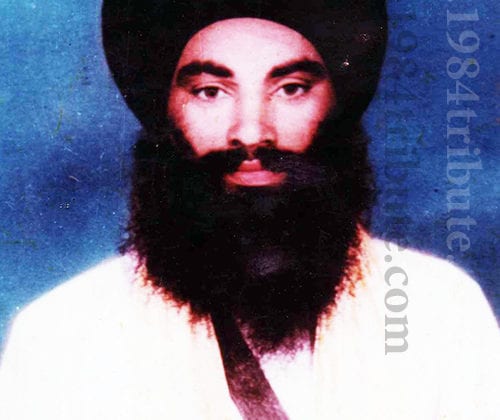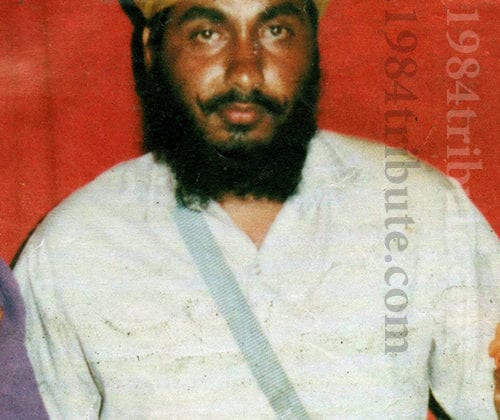Shaheed Bhai Hardev Singh Deba alias Rana
Shaheed Bhai Hardev Singh Deba alias Rana
Khalistan Commando Force
Bhai Hardev Singh Deba alias Rana was born in the year 1970, in the house of Sardar Kulwant Singh and from the womb of Mata Kashmir Kaur, in the village of Bainka, now known as Pahuwind in the district of Bhikhiwind. Bhai Deba was the eldest of four children, he had two younger sisters, Bibi Ranjit Kaur and Bibi Manjit Kaur and a younger brother, Bhai Harcharan Singh. Bhai Deba had a very religious upbringing and the whole family were deeply connected to the Damdami Taksal. Bhai Deba’s father was a devoted, well versed, learned preacher of Sikhi, Sardar Kashmir Singh was a qualified Granthi Singh from Damdami Taksal. The family did not own any substantial amount of land and so, Bhai Deba’s father earned a living by preaching Gursikhi. Bhai Deba studied only up to 8th grade, he completed 5 grades at his local village of Bainka and the remaining 3 grades at Bhikhiwind government school.
In 1980, Bhai Deba’s father was bestowed the duty and job of Head Granthi at the Gurdwara Sahib dedicated to Baba Deep Singh Ji Shaheed’s birthplace. So, the family then moved from Bainka and relocated to a village called Pahuwind. Bhai Deba’s family lived a life instilled with Sikh values and principles, devoted and dedicated to the Sikh Gurus. This had a positive impact on Bhai Deba, who then became a baptised Sikh at a very young age. Alongside his father, Bhai Deba spent a lot of time outside of his school, doing selfless service at the Gurdwara. Bhai Deba was blessed to have been taught all notable Gurdwara duties from a young age by his father. Even the most sacred of service of Sukhasan of Sri Guru Granth Sahib Ji Maharaj was daily performed by Bhai Deba. The amount of Gurbani which Bhai Deba had memorised from a young age was one to aspire to. Little did he know this would stand him up to later become a protector of his faith and fighter for freedom, a Jhujaru Singh.
In the late 1980s, the Jhujaru movement (the struggle for Sikh freedom) was at its peak. The Indian state had fully taken hold of Punjab and completely disregarded any law and order of the land. It had become a guerrilla warfare situation. Anyone identified as an Amritdhari Sikh was targeted by the state Police. Countless innocents were picked up, mercilessly tortured and killed in fake encounters. Bhai Deba too was targeted by the Punjab police simply because he was a baptised Sikh (Gursikh). At this time, Bhai Deba was 19 years of age. He was going about his business and was waiting at the village bus stop. The police happened to drive past and as soon as they caught a glimpse of Bhai Deba stood at the bus stop in his Sikh attire (Bana – Long Chola, Gol Dastar and Kirpan), the police immediately approached Bhai Deba and forcibly threw him into the police vehicle, making an unwarranted arrest.
Once taken to the police station, the treatment and torture Bhai Deba had to endure was vicious and unforgivable. Bhai Deba’s Kirpan was forcefully stripped off him, he was slapped in the face a continuous number of times. During this act Bhai Deba’s turban was swiped off and his hair brutally disrespected. Bhai Sahib was mercilessly tortured and kept in police jail for four days. The police openly accused him of being linked to the Jhujaru Singhs, though there was no evidence nor anything to link Bhai Deba to the Sikh freedom movement. In search of Bhai Deba, his family had approached the village committee (Panchayat) and got him released from the local police station. Upon his release, his body was riddled with injuries and multiple broken bones. His mother and father had to care and tend to his slow recovery. This brutal experience had a profound affect and impact on Bhai Deba. It was so unfair and unjustifiable.
Bhai Deba, like every other Gursikh did support the principles of the Sikh freedom movement after the events of June 1984. But he was only 19 years of age and had not until now thought about joining the Jhujaru Singhs. But the suffering he had just endured made it all clearer that Sikhs were oppressed in their own home and treated like second class citizens by our own people. Bhai Deba decided that it would be more just to join the Jhujaru Singhs and fighting against the injustice and create a country in which no human is mistreated. Bhai Deba decided to sacrifice his life for a just cause, then to be intimidated and humiliated by the police.
Following a few days of recovery, Bhai Deba bid his family farewell and explained he would dedicate himself to selflessly serve the Sikh freedom movement and teach this evil government a lesson. Bhai Deba had made a pledge that he would give up his life and soul for Sikhi and the cause of Khalistan. Bhai Deba left knowing he would never come back to see his home and family ever again. Bhai Deba joined the Jhujaru Singhs of Khalistan Commando Force under the command of Bhai Wassan Singh Zaffarwal and Bhai Pargat Singh Samra. Bhai Deba was given the duty of obtaining and transferring firearms and ammunition from Pakistan. This was done as Bhai Deba understood the border area and was very clever and fast in making such moves.
On 31st January 1990, Bhai Sahib along with nine fellow Jhujaru Singhs were returning from Pakistan, transporting firearms and ammunition. It was late night, crossing the border of a village named Kals. Whilst making the cross over, there was a sudden wave of bullets being fired and strobe lights towards the group by the Border Security Force (BSF). In defence, the Jhujaru Singhs immediately began to return fire. During this shooting, one Jhujaru Singh by the name of Bhai Harjinder Singh Jinda (village Beharwal, near Chung, Khemkaran) was shot and attained martyrdom. Bhai Sahib went running over to Bhai Harjinder Singh Jinda and lifted him up so he could be taken to a safe place. Whilst Bhai Sahib lifted and carried Bhai Harjinder Singh Jinda, a bullet was not far and Bhai Sahib too was shot and instantly fell to the ground, also attaining martyrdom. The other Jhujaru Singhs of that group managed to return back to Pakistan. After some time, a few of the Jhujaru Singhs made it back across the border into Punjab. Bhai Deba’s funeral was conducted under police watch at the village of Patti in the presence of his family.
It wasn’t long after Bhai Deba’s cremation, that the Punjab police pursued Bhai Deba’s family, especially the male members and continued to harass them. More often, they would target Bhai Deba’s Chacha Ji (Sardar Kulwant Singh’s brother), Bhai Jugraj Singh who was also a baptised Sikh. For this reason, he was harassed and tortured. Bhai Jugraj Singh, who at the time was 24 years of age, was a Granthi Singh (Sikh Priest) at Gurdwara Bir Baba Budha Sahib. He was part of All India Sikh Students Federation (AISSF) which was started by Bhai Amrik Singh and was given the duty of main preacher of that region in Amritsar (Chabbal), he was a devoted and dedicated Gursikh, who as well as serving the cause did seva of Sant Jarnail Singh Ji Khalsa Bhindranwale. The continuous harassment by the Punjab police forced Bhai Jugraj Singh to join the Jhujaru Singhs, he joined the Khalistan Commando Force under the command of Bhai Wassan Singh Zaffarwal and alongside Bhai Harjinder Singh Farandipur, Bhai Surjit Singh Farandipur. Bhai Jugraj Singh participated in many successful Jhujaru actions and remained dedicated to the cause.
On 7th December 1991, Bhai Jugraj Singh went to visit his family in his home village of Bainka. The CRPF was tipped off and given intel by an unknown informant. It wasn’t long before the CRPF had surrounded the village. Bhai Jugraj Singh was known to have served justice to many of these CRPF and police perpetrators. So, the CRPF didn’t come lightly, but with a force of up to 10,000 police personnel to surround the village. It can only be imagined the amount of clout and calibre Bhai Jugraj Singh had in this region. The police made an announcement through a megaphone for Bhai Jugraj Singh to drop his weapons and surrender himself. Bhai Jugraj Singh was not one to surrender and denied the order of the Indian security forces. He instead faced them and fought like a lion until his last breath, where he was met with bullets from the CRPF and attained martyrdom. Shaheed Bhai Jugraj Singh was an exemplary example of a true Jhujaru Singh fighting injustice until his last breath.
Information given by the family of Shaheed Bhai Hardev Singh Deba





